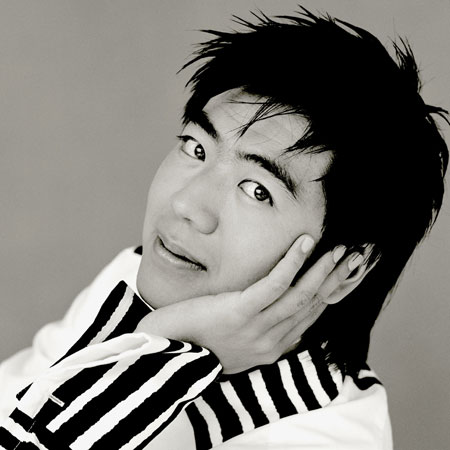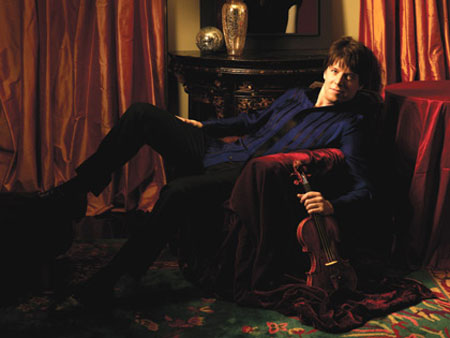Today we learned that Lang Lang is one of the Sexiest Men Alive, or so says People Magazine.
Now, I like Lang Lang a lot, but I have to ask…of all the men…alive…is he really…the superlative of sexy? David Beckham…Lang Lang…David Beckham…
 I didn’t get a sociology/biology degree between his Sexiest Man Alive status being declared this morning and the present moment, but I do know that “sexy” is in the eye of (body of? pheromones of?) the (be)holder. Who am I to say who/what‘s sexy to someone else? Who is People Magazine, for that matter? I always assumed (naively, perhaps) that “sexy” was more attitude than straight-up physical characteristics; “beautiful” and “handsome” can be purely physical, but things like “sexy” and “cute” have some personality traits attached. Or perhaps more than personality elements, “sexy” has both effort and presumably an ultimate goal wrapped into it.
I didn’t get a sociology/biology degree between his Sexiest Man Alive status being declared this morning and the present moment, but I do know that “sexy” is in the eye of (body of? pheromones of?) the (be)holder. Who am I to say who/what‘s sexy to someone else? Who is People Magazine, for that matter? I always assumed (naively, perhaps) that “sexy” was more attitude than straight-up physical characteristics; “beautiful” and “handsome” can be purely physical, but things like “sexy” and “cute” have some personality traits attached. Or perhaps more than personality elements, “sexy” has both effort and presumably an ultimate goal wrapped into it.
So it begs the question: how much or little does it matter if a classical musician is attractive? Not just objectively nice to look at, but actually sexually appealing to their audiences?
I’m always surprised when anything physical about a classical musician is mentioned in the press, and perhaps I shouldn’t be, because physical descriptions are expected across the media of more mainstream performing arts industries-at-large. Just the other day, Peter Margasak previewed Lang Lang’s Chicago Symphony concerts on his Chicago Reader blog: “With his youth, virtuosity, good looks, and dramatic flair, 26-year-old Chinese pianist Lang Lang is as big a star as the classical-music world produces these days.” “Good looks” stood out for me: why even mention that, I thought, it’s a matter of opinion. When Hilary made her Chicago Symphony debut in 2006, not one but three reviews mentioned her looks (hey, maybe it’s a Chicago thing?), and that also struck me as odd. It should be about the rep and the playing, I groaned, but if I’m encouraging press and audiences to write about/think about the people and personalities behind the music in order to increase interest in the art form, why should the physical be off-limits?
Let’s think about the classical musicians who are generally regarded as “sexy”: Joshua Bell, Anne-Sophie Mutter, Anna Netrebko, Placido Domingo, The Eroica Trio? There are other objectively good-looking musicians in the industry, obviously – Esa-Pekka Salonen, Johannes Moser, Elīna Garanča, Hélène Grimaud, to name a few – but they don’t come to mind immediately. Do the ones who do come to mind, come to mind because they want to come to mind? Are they the few who have recognized and used their appeal to further their careers? Alternatively, have their “teams” “handlers” “crew” (that is, managers and publicists) done it for them?
![Netrebko-Kasskara-400[1].jpg](http://www.artsjournal.com/lifesapitch/Netrebko-Kasskara-400%5B1%5D.jpg)
 And does the classical music industry give artists the opportunity to use their physical attractiveness in a positive way, that is, to literally attract new audiences? It seems to me that the ones who do use their sex appeal (in publicity photos, in the way they dress in performance) are often mocked and considered less serious musicians than the ones who don’t. How did we get to a place where sexiness is actually made fun of? Frowned upon? Isn’t it a…good thing?
And does the classical music industry give artists the opportunity to use their physical attractiveness in a positive way, that is, to literally attract new audiences? It seems to me that the ones who do use their sex appeal (in publicity photos, in the way they dress in performance) are often mocked and considered less serious musicians than the ones who don’t. How did we get to a place where sexiness is actually made fun of? Frowned upon? Isn’t it a…good thing?
Do folks go to concerts because they find an artist attractive, or is that just an added benefit after the tickets have been bought? I may or may not have scored a ticket to Johannes Moser‘s last NY Philharmonic concert because I think he’s dreamy, but clearly that wasn’t the only reason I went. (…and I saw the new Bond movie for Dame Judi Dench.) So how should his manager and publicist use the fact that he is darn attractive to their (his) professional advantage? Is physical attractiveness just one more thing Negative Nancy’s can use to criticize, judge and qualify artists’ achievements (along with, well she got that cancellation, he got that Times profile, so on, so forth), or is it more dangerous and personal than those other possible “explanations” for success?
Update 11/24 – for more on the same subject, see the St. Louis Symphony Orchestra’s Eddie Silva’s piece on Playbill Arts dot com. Silva points out that journalists referencing sex(iness) in the context of an artist’s playing achieves a kind of ideal: acknowledging that the artist is a trying to be attractive with their concert attire/general presence, but using that attitude/appearance to describe the actual music. See Anne Midgette’s recent review of Hilary’s NSO concert as an example:
Hahn then made her entrance in a black dress with decollete that
reached nearly to her navel. I would not mention the soloist’s dress
had it not so well matched the piece she played, and the way she played
it. On most women, that dress would have appeared provocative, vulgar;
on Hahn it epitomized cool and classic elegance. By the same token, she
took Paganini’s showy and probably vulgar piece and treated it as if it
were the finest music, and as if her prodigious feats of violin playing
were all in its service.

As a presenter rather than an artist’s publicist, I don’t need to worry so much about the more “meta” problem of what happens when you brand an artist as sexy. (Though, isn’t the (mis)perception that attractive people are necessarily less skilled pretty much universal, not really specific to classical music? Yet, at the same time, in our society they are more successful, on average …)
I’ll tell you this, though: we’re presenting Nathan Gunn in a Valentine’s Day recital, and I have every intention of using his apparent inclusion in this year’s “People” sexiest list (alongside Lang Lang) as a hook. On the other hand, when we were pondering who to put on the cover of our seasonal brochure, we ultimately decided to go with an action shot of a violinist rather than Gunn’s dreamy portrait. It just made the piece feel too much like an issue of GQ and not enough like a performing arts series. I guess you can be too sexy, at least for direct mail.
I think you’re missing the point, and so is commenter Charlotte. It’s not that there’s anything wrong per se with playing up the attractiveness of a performing artist, especially someone with unquestionably superlative gifts, like Lang Lang or Ms. Hahn.
The problem is that, in theory at least, classical music is about values that transcend the visual, transcend the superficial, that are literally intangible. The superstars like LL who are competing for mass-media attention with popular culture icons, well, I certainly understand promoting the physical attractiveness side. But what’s really pathetic is what we’re starting to see at the level of basic classical-presenter concert booking, where groups from the get-go are touting looks as the PRIMARY thing setting them apart from the pack. I finally opened the Chamber Music America directory issue and found it incredibly depressing. Here’s a group (good players too) who use three buzzwords to describe their group in their ad, “Beauty” being the first. They ain’t talkin’ ’bout the beauty of the Ghost trio, that’s for sure.
What’s depressing about it is that an atmosphere is being fostered where classical music (in its attempt to compete for attention with other pop culture formats) is starting to adapt the same emphasis on superficiality and transient appeal that reign supreme in commercial “culture.” Is that so bad? Well, not necessarily always, but what about the female violinist who is kind of overweight and not particularly beautiful? What kind of chance does she have in that culture, regardless of how she plays?
I understand your concern, Phillip, but I have to ask: Is this new? Or exclusive to classical music? If the violinist in your example were an investment banker and she went head-to-head with a similarly skilled candidate who was far more attractive, statistics say her competitor would fare better.
Yes, people will use every advantage they have to market themselves, in whatever field, and that includes looks. I’m not surprised to hear that advertisers in Chamber Music America are on to that. But I also believe that the market forces in classical music won’t allow looks to trump all else. Being a hunk will provide a marginal advantage in classical music, as it does everywhere in life, but the quality of a musician’s performance is simply too important to most artistic directors, most presenters, and even most audiences to allow it to trump all else. Perhaps, of the many skilled musicians out there, the most attractive will have an advantage. But would that be different from anywhere else in society? More importantly, as you seem to allude to, would it truly be different from any other era in classical music history? I’m skeptical. How many composers cast their muses in lead roles?
Somehow the photographs in which classical musicians are supposed to appear sexy always come off like glorified Glamour Shots. Like that Josh Bell shot looks really silly to me. The Lang Lang photo is not much better. Not sure what woman that is in the middle, but she’s in the middle quality-wise also.
I always see these original and interesting photos of pop musicians and think “Why can’t classical musicians have cool photos like that?”
All this is by way of saying that I mind it more when musicians are trying too hard to appear sexy. If a musician is succeeding solely on the basis of good looks, he or she will be brought down by age or audience realization at some point. And if not, it wouldn’t be the first time someone untalented but attractive got to make a bit of money off the second attribute.
I think that an artist’s talent speaks for itself, however, promotional photography of an artist that is creative and visually striking can compliment marketing campaigns for recordings and performances and help the artist stand out from the crowd. If a potential audience member is attracted to a musician’s appearance, they will be doubly pleased when they hear that musician’s performance. Classical artists need groupies too!
It’s true. Sex sells, even in classical music. As a classical music marketer, I definitely believe that having an attractive, youthful image associated with performances makes a difference–for many prospective ticket buyers, not for all…
Personally, I think anyone who has something to do with the creation of music has sex appeal. Lyle Lovett doesn’t look like Brad Pitt, but he sure floats my boat, with or without a pony. Lang Lang doesn’t look like Nathan Gunn, but his playing is so sensual and passionate…*sigh*
Being creative means being totally hot, in my book, and perhaps that’s how classical artists are bringing sexy back.